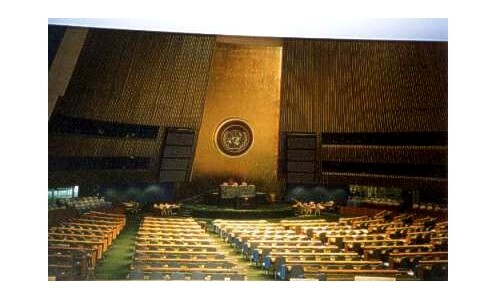United Nations News Service 20 July 2004

United Nations General Assembly
The United Nations General Assembly today delayed until Tuesday a vote on a draft resolution introduced by Arab countries that seeks to end Israel’s construction of a separation barrier in and around the West Bank after the barrier was declared illegal by the International Court of Justice (ICJ).
The vote had been scheduled for today after Jordan introduced the draft text last Friday during a resumption of the Assembly’s tenth emergency special session on illegal Israeli actions in occupied East Jerusalem and the rest of the occupied Palestinian territory. The Assembly convened today only to hear minor amendments to the text.
On 9 July the ICJ - the UN’s principal judicial organ - issued an advisory opinion saying the separation barrier was illegal and that construction must stop immediately. The Court also said Israel should make reparations for any damage caused, and that the Assembly and the Security Council should consider what steps to take “to bring to an end the illegal situation” created by the barrier.
Earlier Tuesday, UN Secretary-General Kofi Annan was asked if the Security Council should take up the issue.
“I think [it] is before the General Assembly and I am not aware that the Council is going to take it up at this stage. I think the General Assembly should conclude its work,” he replied.
Secretary-General’s press encounter upon arrival at UN Headquarters
SG: Good afternoon, ladies and gentlemen. It has been a while. It’s good to see you again. I think you have lots of questions for me and so we should go straight to it.
...
Q: Mr. Secretary, how important do you think it is for the Security Council to again take up the issue of the barrier wall in Israel?
SG: I think the issue is before the General Assembly and I am not aware that the Council is going to take it up at this stage. I think the General Assembly should conclude its work.
Q: But because the General Assembly will have no exact binding effect on Israel, do you feel that it should go before the Council where there could be a vote on something that might have the force of law?
SG: I have no indication that the Member States are going to take it up in the Council. As I said, for the moment, it’s a General Assembly issue and I’m waiting to see what the General Assembly decides.
Q: With regard to the situation in Gaza, what’s happening within the PA [Palestinian Authority] has been described as probably one of the most serious crises that [Yasser] Arafat has faced since 1983. What is your understanding of what the situation there is at the moment, and do you feel vindicated after the criticism that Mr. [Terje Roed] Larsen leveled at the PA last week?
SG: I made clear in my own statement that I supported Larsen’s statement, and he was stating the facts and I think events have borne him out. But that is not anything to take satisfaction from. What is important is the actions that need to be taken on the ground to bring it under control and for the Palestinian Authority to take the steps necessary and to begin to reform, particularly bringing the security forces under one command. And I think this has also been one of the difficulties of the Prime Minister, Abu Ala.
Q: Sir, would you be concerned that Arafat may actually survive this particular crisis? Do you think it would be a good thing for the Palestinians that he does or does not survive?
SG: I think that is an issue for the Palestinians to decide. But what is important is that they are facing a serious situation, a serious crisis, and they have to take steps and measures to bring it under control because without that, it is going to be very difficult to see any progress in the way forward. So I think it is important that they tackle this issue seriously. It is a serious crisis with the Prime Minister at the centre of it, and I think that Chairman Arafat should really take the time to listen to the Prime Minister and other members of his leadership, and take the necessary steps to bring the situation under control, and to work with the Egyptians and the Jordanians and the international community to reform his security apparatus.
...
Q: Are you still optimistic that the withdrawal from Gaza would happen, would materialize soon, and has the role of the United Nations been formulated yet, during the last meeting of the Quartet?
SG: I think that Prime Minister Sharon has indicated that he is going to go ahead with the withdrawal, and the partners he is trying to bring into the Government, the Labour Party, is on record as supporting the withdrawal. And so I think the withdrawal will take place. What we have suggested is that it should take place along the lines of the Roadmap and that the international community, in the form of the Quartet, and the UN as a member of the Quartet, can play a role in the withdrawal. And we believe that if it is handled properly, it may provide an opportunity for us to move the process forward. If it is handled wrongly, then it is something else.
...
Thank you.
Related Links